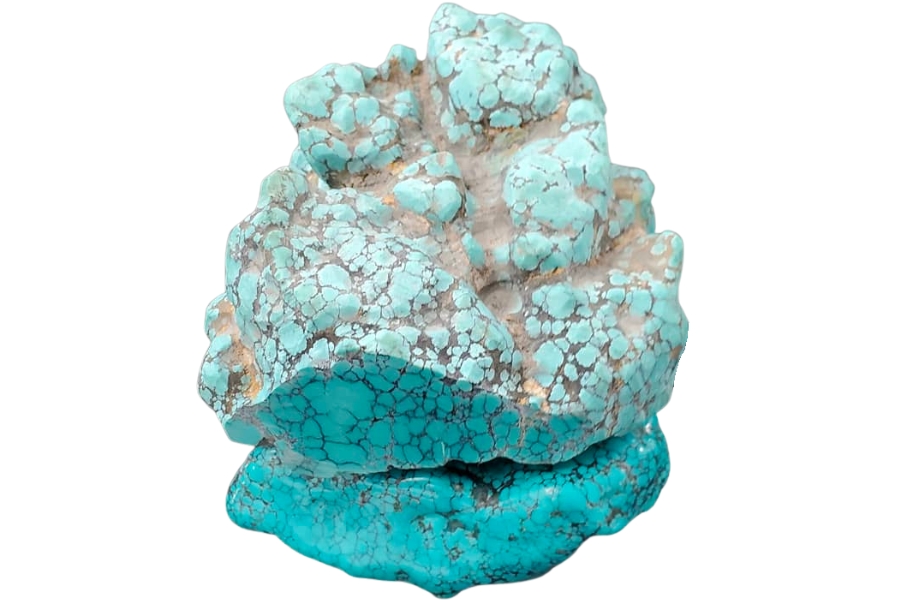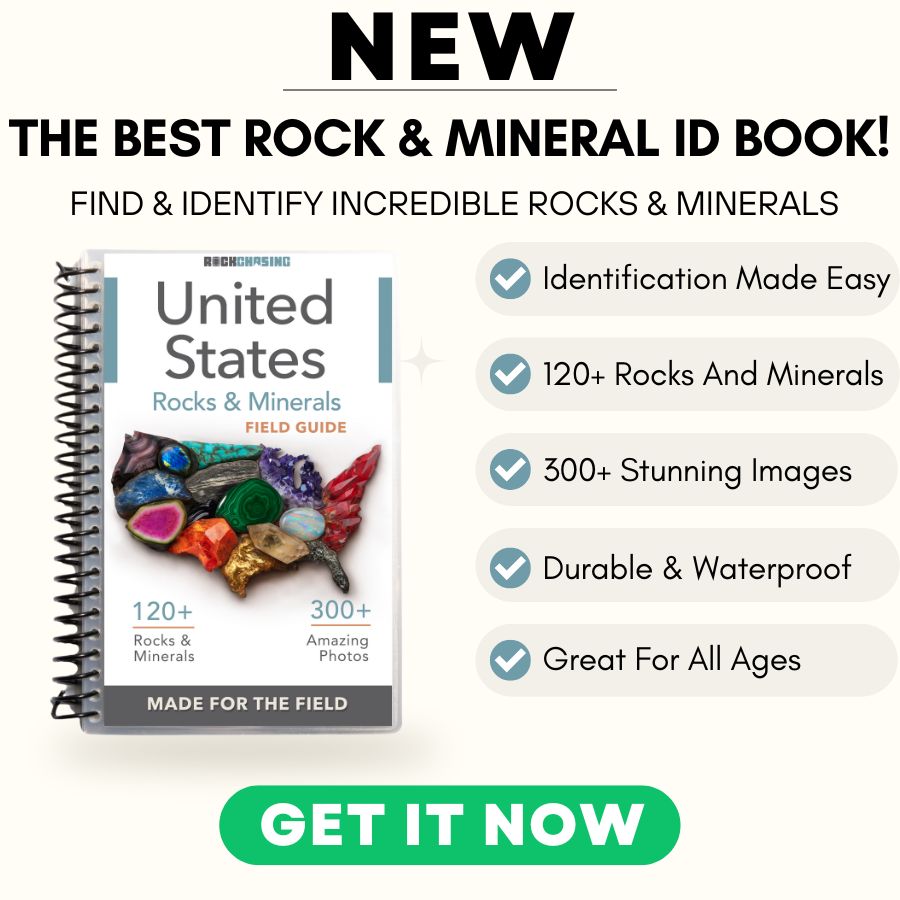Oregon, a land of natural beauty, holds a treasure trove of rocks and minerals. That’s why its diverse geology is a haven for rockhounds! From the lush forests to the rugged coastlines, it has a variety of landscapes that hold unique rocky wonders.
Among these precious finds is the beautiful and vibrant turquoise. If you’re wondering where exactly to look for Oregon turquoise, we’ll show you the proven places where rockhounds and rock enthusiasts before you have found them.
Finding turquoise in Oregon may be a challenge of its own, but with a keen eye, you’ll find them in places like the Alvord Desert, Columbia River, Salem Hills, White River, and Nehalem River.
Let the rocky trails of our state lead you to the heart of turquoise!
What Is Oregon Turquoise Anyway?
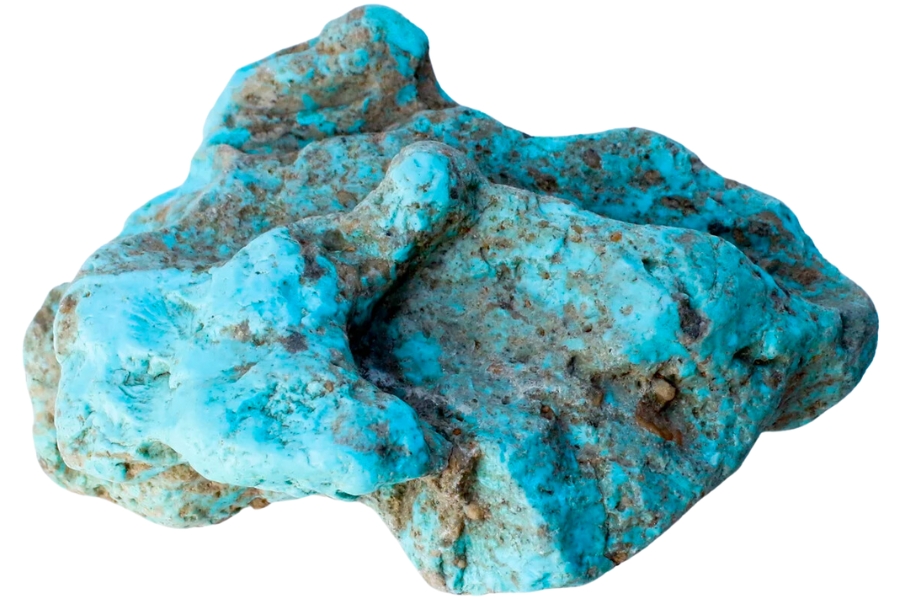
Turquoise is a captivating gemstone that comes in delightful shades of blue and green. It’s like having a piece of the sky with you! Its color makes it easy to identify turquoise from its hiding. It forms when water seeps through rocks, picking up copper, aluminum, and other minerals on its way.
This gem has been beloved for thousands of years and admired by ancient civilizations like the Egyptians and Native Americans. To this day, the price of turquoise remains to reflect people’s appreciation of its beauty and uses.
Turquoise is often used to make beautiful jewelry. Imagine wearing a necklace or a ring with a piece of this blue wonder. But it’s not just pretty; many also believe it has healing properties and can bring good luck.
It’s often found in arid regions where the unique combination of minerals in the soil and the action of water create the right conditions for it to form. Places like the American Southwest are famous for their turquoise. Other countries like Iran, China, and Mexico are also known for this beautiful gem.
The Types Of Turquoise Found In Oregon
When you’re out exploring the depths of Oregon to find turquoise, be aware that these are the different colors it may come in:
- Sky blue turquoise
- Blue-green turquoise
- Green turquoise
- The deep experience and understanding of our team about the area
- Recommendations from local groups and clubs
- How easy it is to get the a particular location
- Safety and potential hazards when collecting
- Weighing private and public locations
- The ability for both experienced and novice geode enthusiasts to find great samples
With these factors in mind we’ve been able to put together a fantastic list that just about anyone can use!
The Best Places To Find Turquoise in Oregon
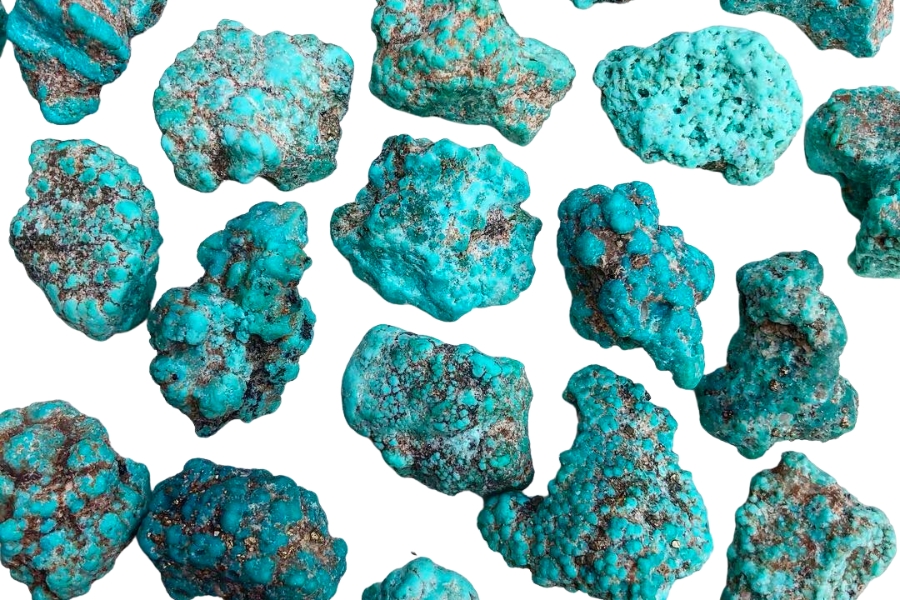
As we said above, Oregon has a plethora of gem mine sites. But if you want to find Oregon turquoise, your best chance to do so is to explore the following proven places that contain them:
Always Confirm Access and Collection Rules!
Before heading out to any of the locations on our list you need to confirm access requirements and collection rules for both public and private locations directly with the location. We haven’t personally verified every location and the access requirements and collection rules often change without notice.
Many of the locations we mention will not allow collecting but are still great places for those who love to find beautiful rocks and minerals in the wild without keeping them. We also can’t guarantee you will find anything in these locations since they are constantly changing.
Always get updated information directly from the source ahead of time to ensure responsible rockhounding. If you want even more current options it’s always a good idea to contact local rock and mineral clubs and groups
Alvord Desert
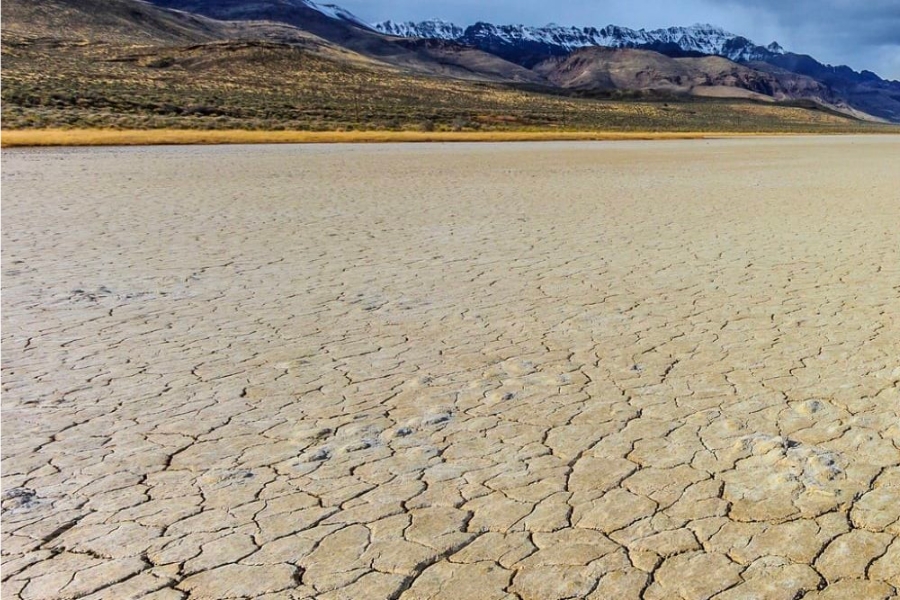
The Alvord Desert is a dry lake bed that stretches over miles, offering a vast playground for rock hunters. Its floor is a canvas of cracked mud, while the surrounding mountains stand as silent witnesses to the geological wonders that took place over millions of years.
The geology of the Alvord Desert is a blend of volcanic and sedimentary rocks, a perfect concoction for turquoise formation. Its terrain is flat and open. The Steens Mountain looms large on the western edge, making the contrasting landscape of flat desert and towering mountains a sight to behold!
If you want to visit, be aware that getting to the Alvord Desert is a journey through Oregon’s scenic landscapes. From Burns, take Highway 78 East, then switch to the Fields-Denio Road which will lead you to the desert.
But before you head out, it’s essential to get familiar with and abide by Oregon’s latest collecting guidelines.
Where we found turquoise in the Alvord Desert
You can find different sizes of turquoise at the Alvord Desert if you explore the areas with exposed bedrock, dry lake beds, or along the slopes and base of the surrounding mountains like Steens Mountain.
If you want REAL results finding incredible rocks and minerals you need one of these 👇👇👇
Finding the coolest rocks in isn’t luck, it's knowing what to look for. Thousands of your fellow rock hunters are already carrying Rock Chasing field guides. Maybe it's time you joined the community.
Lightweight, mud-proof, and packed with clear photos, it’s become the go-to tool for anyone interested discovering what’s hidden under our red dirt and what they've already found.
Join them, and make your next rockhounding trip actually pay off.
What makes it different:
- 📍 Find and identify 140 incredible crystals, rocks, gemstones, minerals, and geodes across the USA
- 🚙 Field-tested across America's rivers, ranchlands, mountains, and roadcuts
- 📘 Heavy duty laminated pages resist dust, sweat, and water
- 🧠 Zero fluff — just clear visuals and straight-to-the-point info
- ⭐ Rated 4.8★ by real collectors who actually use it in the field
Columbia River
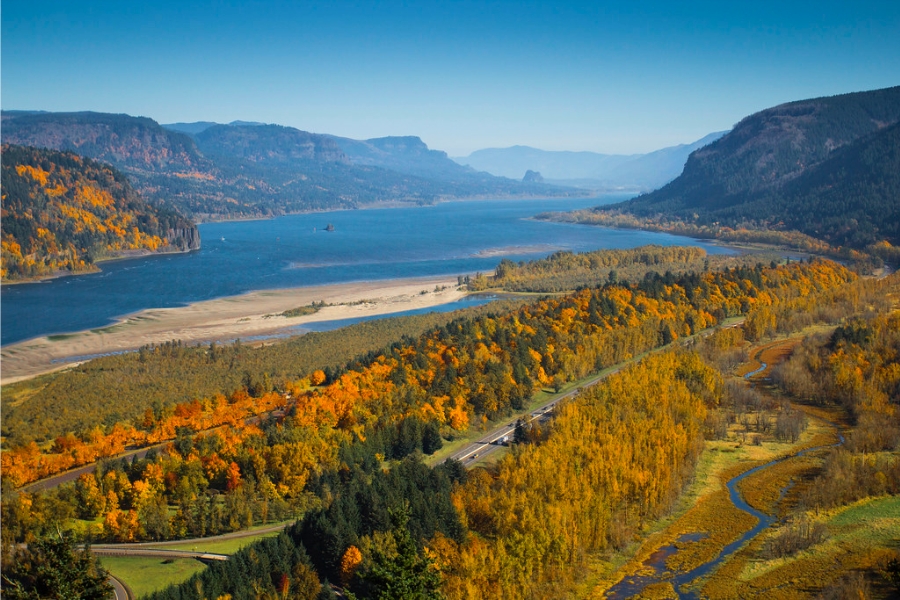
Columbia River is the largest river in the Pacific Northwest. Stretching over 1,240 miles, it begins its journey in the Rocky Mountains of British Columbia, Canada, flowing through diverse terrains to meet the Pacific Ocean.
The part of the river that carves through Oregon is particularly intriguing for rock hunters. As it passes through the Cascade Range, it forms the Columbia River Gorge, a breathtaking landscape of mountains, bluffs, and cliffs.
The gorge is where the river interacts with an active volcanic arc at the edge of a major plate boundary. Its surrounding regions have a rich basaltic geology due to ancient lava flows, part of the Columbia River Basalt Group, which covered northern Oregon around 17 to 6 million years ago.
If you’re coming from Portland and you want to go here, take the I-84 E highway, which will lead you directly to the gorge.
Where we found turquoise at the Columbia River
The mix of volcanic and sedimentary rocks in the Columbia River gorge and nearby areas hold promise of turquoise finds. You can also search for this gem in the swamps near the river itself.
Salem Hills
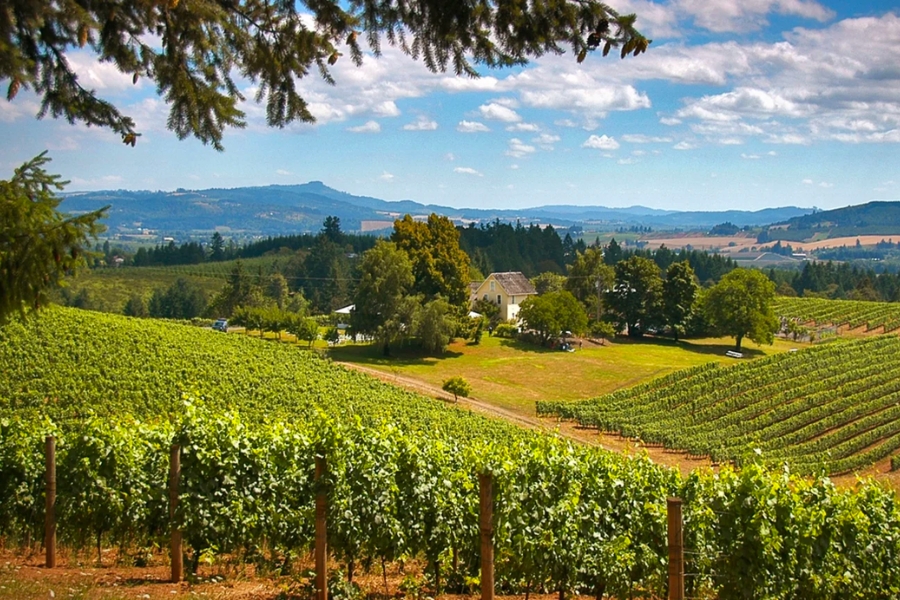
Nestled in the heart of the Willamette Valley, Salem Hills have witnessed the geological ballet of nature over eons. This place has an enticing blend of moderate elevations ranging from about 150 to almost 1,100 feet, with the serene Mill Creek meandering through, carving its way to the wider expanses of the Willamette Valley.
Its terrain is a canvas where past volcanic activities have painted a picture rich in minerals. Among the geological treasures are the Ferruginous Bauxite Deposits, a legacy of Miocene basalts.
Embarking on a rock-hunting adventure to the Salem Hills is like turning the pages of a living geological book. If you’re coming from the heart of Salem, take OR-22 E and continue on State St. Follow signs for Stayton/Sublimity for about 10 miles to get here.
Where we found turquoise at Salem Hills
The Ferruginous Bauxite Deposits in Salem Hills are notable for interesting minerals, including turquoise.
White River
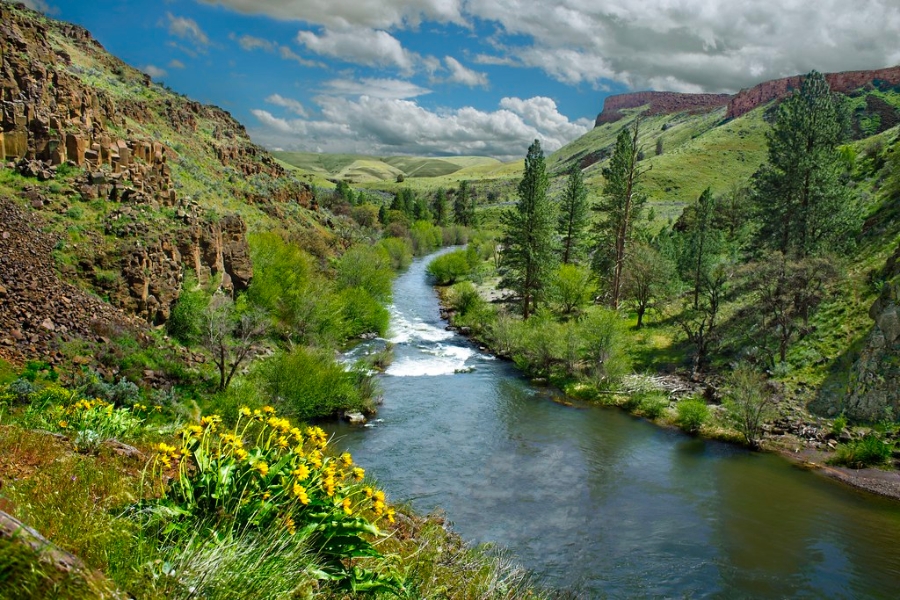
White River flows through regions rich in volcanic history. As you wander along its riverbanks, you’ll find yourself amidst a variety of rocks and minerals. The terrain around the river is a blend of forested areas and open lands, offering a picturesque backdrop for any activity, especially finding Oregon turquoise.
The geology of the area around White River is a palette of colors. Among its rocks, the elusive turquoise hides. The region’s volcanic history, with the right blend of minerals in the soil, creates a favorable environment for turquoise formation.
To reach this rocky wonderland, you would start your journey from the nearby town of Maupin. Take the US-197 S from Maupin and follow it to the White River Road.
Where we found turquoise at the White River
To find turquoise, explore White River’s riverbanks, nearby creeks, and areas with exposed bedrock. Its surrounding mountainous areas and other nearby locations that have a history of volcanic activity or sedimentary formations are also promising spots to explore.
Nehalem River
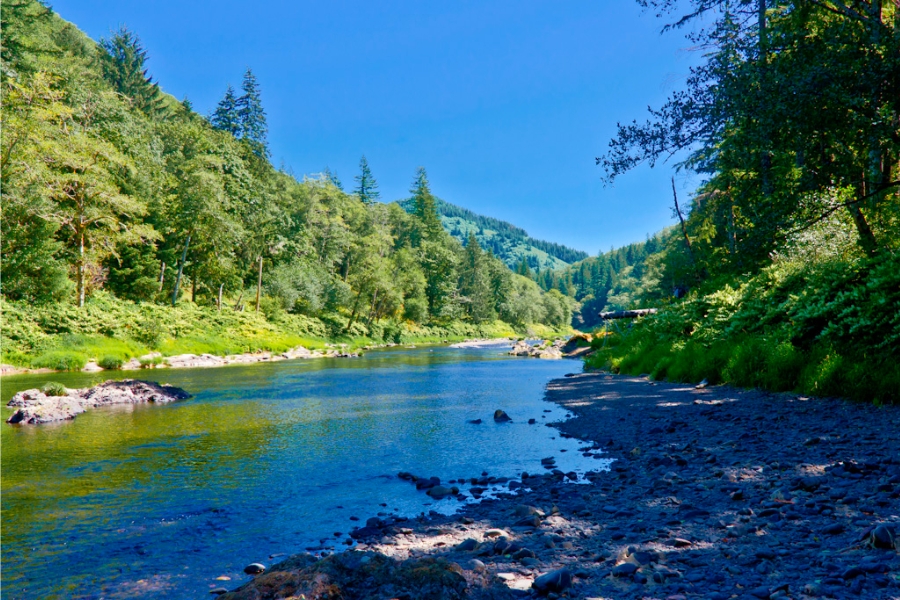
The Nehalem River, located on the Pacific coast, flows through a captivating landscape. Stretching about 119 miles long, it unveils the hidden beauty of the Northern Oregon Coast Range as it courses through, initially rising in the northeast corner of Tillamook County within the Tillamook State Forest.
This river’s vicinity is a paradise for rockhounds. The ancient volcanic activities here have paved the way for a diverse range of rocks and minerals, including turquoise. Its trails, scenic waterfalls, and old native forests only add to the allure of the place.
If you want to go here from Portland, take the U.S. Route 26 W and OR-53 S to the Nehalem River area. The journey itself is a prelude to the geological marvels that await, as the road winds through lush forests and alongside bubbling streams.
Where we found turquoise at Nehalem River
One of the best spots to seek out turquoise at the Nehalem River is along the public areas of the river near Timber Road and the Banks-Vernonia State Trail. The gravel beds and banks here are especially promising, housing colorful gems and other volcanic minerals and stones.
Common Turquoise-Hunting Questions
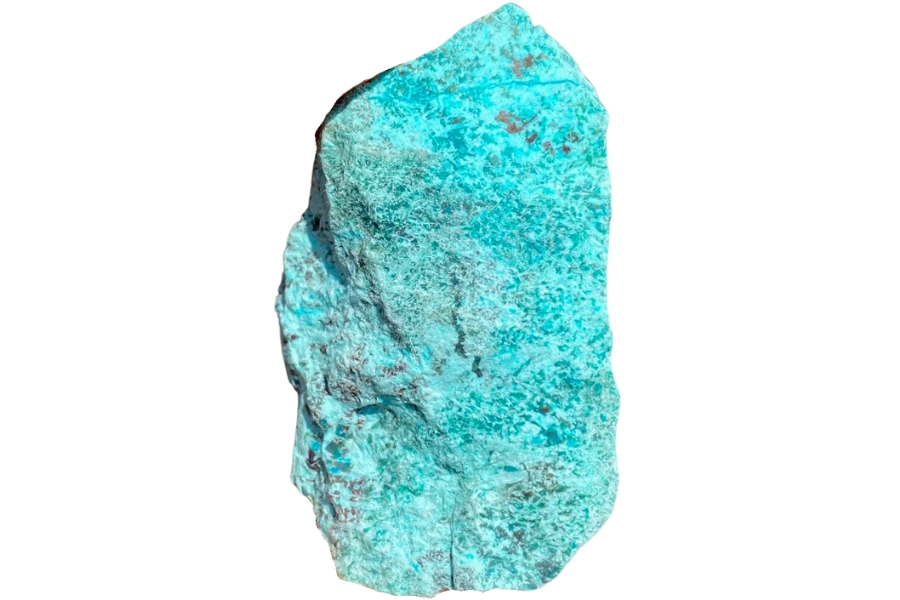
Before you head out here, it would help you to know the answer to the most common question when it comes to finding turquoise in Oregon:
Is it illegal to collect turquoise in Oregon?
Rockhounding, including the collection of rocks and minerals like turquoise for personal, non-commercial use, is generally allowed on public lands managed by the Bureau of Land Management (BLM) and the U.S. Forest Service, given certain conditions.
According to the BLM and the U.S. Forest Service, no permits are required for collecting rocks and minerals as a hobby as long as the materials are for personal use and not for sale.
However, there are specific regulations you need to adhere to, depending on the area you are collecting from. For more information on these, consult with the Oregon Department of Geology and Mineral Industries.
The Best Places To Buy Turquoise In Oregon
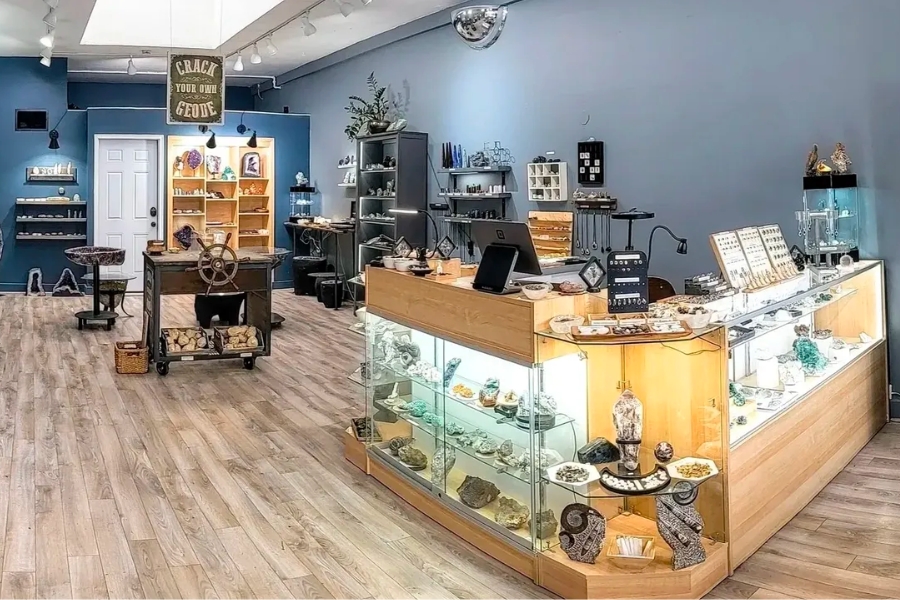
Another way you can find and possibly take home turquoise from Oregon and other parts of the world is by paying a visit to our trusted rock and mineral shops.
Be mindful that what you’ll find in the following places may be a combination of raw, polished, and cut turquoise. You may even find pieces that are already set in jewelry.
- 5 Elements Gem & Mineral – 2100 W Broadway, Eugene, OR 97402
- Mystery Gallery Rocks – 13750 SE McLoughlin Blvd, Oak Grove, OR 97222
- ORO – 3562 SE Hawthorne Blvd, Portland, OR 97214
- Portland Rocks – 6658 SE Milwaukie Ave, Portland, OR 97202
- Prehistoric Rocks Fossils Minerals – 1425 NW U.S. 101, Lincoln City, OR 97367
- The Fossil Cartel – 333 SW Taylor Street Suite 150, Portland, OR 97204

